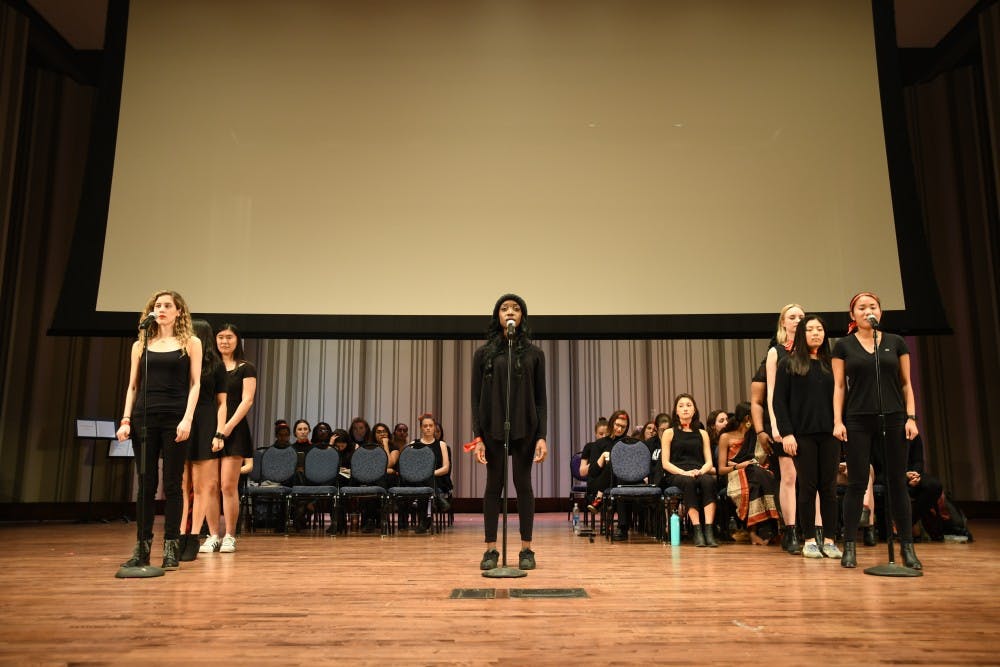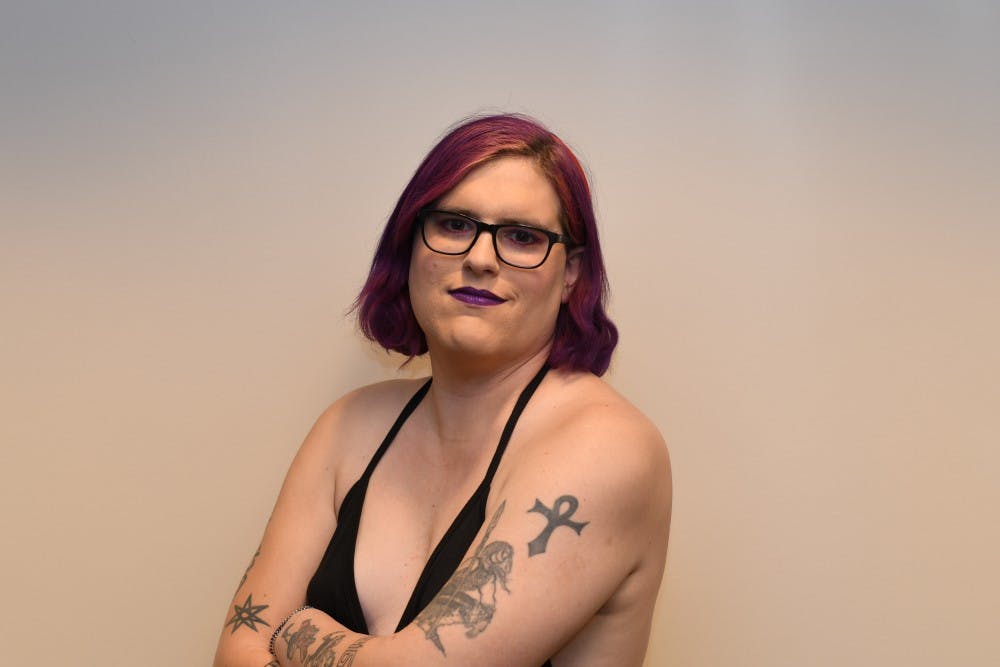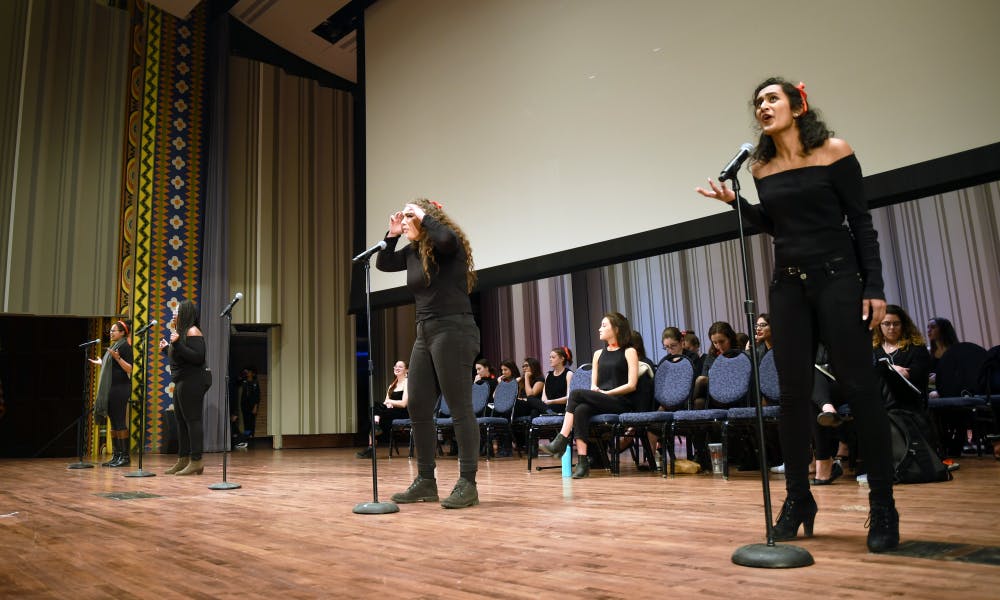
Marissa Alexa McCool is a 2017 graduate of the College of Liberal and Professional Studies. McCool performed in this year’s Penn production of “The Vagina Monologues.”
My feelings on this show are a series of contradictions.
Not the production or the cast, mind you, but the material itself. It’s a vicious cycle of wanting to be grateful for something that has helped the words of feminism and sexual violence awareness reach so many new eyes and ears, but also being aware that the narrative seems directed toward a specific audience, as well as coming from the perspective of one.
Then I feel guilty for not wanting to be the Ungrateful Millennial™, but also acknowledging that, at the age of 32, the cast I’m working with grew up in a drastically different world than the one I did, and their experiences don’t relate to this narrative as much. Campus violence, the internet, and social media — three issues ubiquitous to the traditional student attending Penn right now, are glaringly absent from these stories.

Marissa Alexa McCool // Photo from Susanna Jaramillo
I appreciate there being a trans story. Even in 2018, our visibility is difficult, and to be visible is dangerous. Yet, the story itself is problematic, both for story reasons that I don’t have the time or space to get into, but also, as I consider my husband who is trans in his own right. He was born with a vagina, and the only mention his perspective gets at all is from the board being sure to specify the phrase “women or people born with vaginas.”
And while trans women are given that specific monologue, that’s the only time they’re represented in the entire show. None of the other stories even mention it in passing as far as I can tell. Not to mention, even as wonderful and sincere as the cisgender performers of the piece are this year, it speaks a bit to the perception the show has that no trans performers are present for that piece. I was cast as a fill-in last year, and somehow in 17 years of the production, that was the first to include trans performers.
I appreciate the awareness and attention the show brings toward sexual violence. The #MeToo era was possible in part because of the unapologetic assertiveness of this show. Yet, the women backstage to whom I speak who are from marginalized communities, especially POC, struggle to find their voices and representation found within these words. Given my aforementioned contradictory feelings of the trans narrative, I can somewhat relate.
I acknowledge how important this show was for women and feminism. Yet for all the good it does, wonder why the license and copyright are so stringent, to the point that I wrote my own Monologue speaking to my experience last year, and couldn’t perform it because of license difficulties that prevent performers working in their personal experiences to a show that’s supposed to speak of personal experience. Performing my own piece this year comes with the acknowledgement that I am a spotlight performer coming in from the outside world as a Penn alum, and that’s a huge deal, considering it was out of the question last year. If the point of the show is to speak for women, why make it so difficult for women to speak their own words?

However, the place I harbor no contradictions is my love for the production of the show and its cast.
Last year, being a part of the production, I heard not a single member of the cast question my gender or my being there. Before the show, in an intimate gathering where everyone was free to speak, I read the Monologue I wrote and felt nothing but welcomed, protected, and loved. This year was more of the same.
I was blown away by the disclaimers these brave people put into the opening of the show, acknowledging these same tangled webs that I’ve mentioned and beyond. I imagine that, like me, it’s the community of the production, and the truly safe place within it, that draws so many back, despite the problematic nature of the show itself. The first interaction I had with a cast member in the locker room mentioned how cisnormative the show is. Some spoke of their trans friends who refuse to attend this show for that reason, and I can’t blame them. The awareness and empathy I’ve observed and experienced from this production are second to none. That’s why driving the entire way from Saint Paul was worth it to be here.
As I write this story from my hotel room after the Friday night show, I can’t help but share what I told my husband once we were in the car. After he had dried my tears of gratitude from the countless cast members and people from the audience saying such wonderful things to me and giving me hugs (all of whom asked first, which was amazing in and of itself), I spoke of the age and generation difference between me at age 32 and the cast and production team, 10-14 years my junior. I said that if these are the people who are going to run the world, we’re going to be okay. We’re going to make it.
It was this show, even with its well-documented problems, that made that experience possible. I can also say that the community and the safety felt within it are what brought people like me back, and I know I don’t only speak for myself in that regard.
MARISSA ALEXA MCCOOL is a 2017 graduate of the College of Liberal and Professional Studies who majored in English and Cinema and Media Studies. She is currently living in Saint Paul, Minn. Her email address is rismcwriting@gmail.com.
The Daily Pennsylvanian is an independent, student-run newspaper. Please consider making a donation to support the coverage that shapes the University. Your generosity ensures a future of strong journalism at Penn.
Donate







